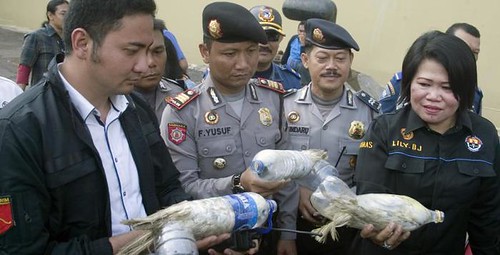UPDATE – Indonesia urged to combat wildlife smuggling
 Wednesday, May 6, 2015 at 11:36
Wednesday, May 6, 2015 at 11:36 
NGO says port where police seized more than 20 live birds in bottles is a transit point in smuggling protected wildlife.
JAKARTA, Indonesia – An Indonesia-based environmental protection organization has called on the government to tighten measures against the smuggling of wildlife after police discovered more than 20 endangered birds in plastic bottles on a ship.
The chairman of ProFauna Indonesia told Anadolu Agency on Wednesday that the port in Surabaya city where a man was recently arrested for smuggling 23 live birds — including 22 endangered yellow-crested cockatoos — was a transit point in the illegal trade of protected wildlife.
“We asked the transportation department to tighten supervision of passengers,” Rosek Nursahid said. “There should be a ban on bringing protected animals in public transportation such as train, aircraft, boat and bus.”
Police arrested Mulyono — who like many Indonesians uses only one name — at Tanjung Perak Port on Monday while he was carrying a yellow-crested cockatoo and a green parrot.
National news agency Antara reported that police also seized 21 other yellow-crested cockatoos that Mulyono, 37, would not claim.
Aldy Sulaiman, a police officer at the port, told reporters that the birds were listed as protected and were “put in bottles of mineral water” to prevent them from drawing suspicion by flapping their wings.
Yellow-crested cockatoos have a value of around $1,500 each on the domestic market.
According to Antara, Mulyono admitted to transporting only two birds obtained from friends in Ambon in the Maluku islands, saying he did not know about the others and their protected status.
“I was told to take care [of them],” he said, explaining that he could teach them words to repeat.
If convicted, Mulyono will be subject to the legal chapter on Conservation of Natural Resources and Ecosystems that carries a penalty of up to five years in prison and a fine of Rp 100 million (around $7,700).
Nursahid referred to a ProFauna report from 2002 in telling Anadolu Agency that smuggling methods had not changed significantly in the following years.
The report titled “Flying Without Wings” detailed the routes through which parrots and cockatoos were illegally moved between Indonesian islands and to foreign countries, and revealed that around 15,000 parrots and cockatoos were captured.
It said that the illegal bird trade had an annual estimated value of Rp 10 billion ($770,000), with Tanjung Perak Port being a main transit point to big cities.
“It shows that there is weak observation in the port,” Nursahid said.
So far this year, ProFauna has recorded five cases in which protected animals were smuggled through the port, while police have seized hundreds of birds brought from Maluku and Papua.
In a 2014 report, ProFauna recorded that 4,000-5,000 protected birds were caught for sale on the islands.
The death rate among parrots during the illegal trade process reaches 40 percent due to cruel capture methods, and poor transportation and maintenance.
Nursahid explained there had been a shift in the trade from conventional markets to online platforms including social media.
ProFauna recorded 3,600 cases of wildlife trade online in 2014 — an increase of 300 percent compared to 2012.
A recent survey by the NGO also found that younger people were increasingly becoming buyers in the illegal trade.
“Because there is a change from the conventional [trade] to wildlife trade online, there is also a shift in the consumer,” Nursahid said. “If 15 years ago, the consumer in the wildlife trade was people aged 40 years and above, buyers now spread to young people.”
He added that high school and college students were becoming consumers under the influence of advertising in social media.

